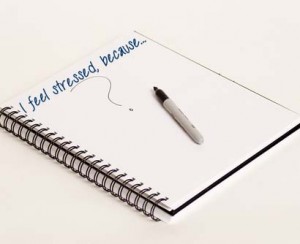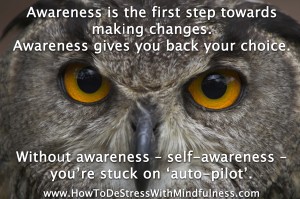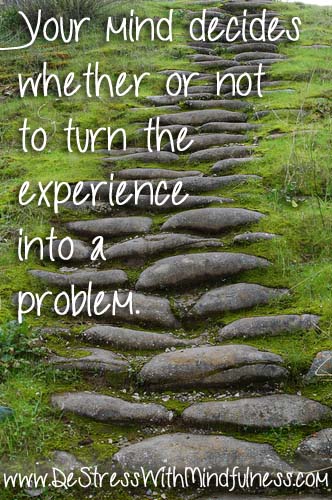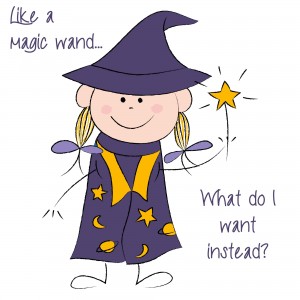Your thinking mind is the bit that gets you stressed; so it’s lucky that your unconscious mind holds the magic keys to setting yourself free!
Hi %%FIRST_NAME%%,
Welcome to day 8 of How To De-Stress With Mindfulness.

Here’s where to listen to the audio recording of today’s message.
[audio:https://s3-eu-west-1.amazonaws.com/htdswm/01/Day04-full-message.mp3]
![]() To download it to listen offline, right click and choose ‘save as’ for this link: Day 8 MP3
To download it to listen offline, right click and choose ‘save as’ for this link: Day 8 MP3
How are you getting on so far? Any insights? Any questions?
Please make the most of the online forum, even if it’s not usually your ‘thing’!
It’s a core part of this course – allowing you to benefit from interactions with others, to get answers to your questions, to get moral support when you need it and to gain deeper insights – making faster progress – towards your de-stressing goals.
There’s no obligation to join in, but you’ll get so much more from this course, if you do!
If you have any techy questions, please email a member of my team on hello@clarejosa.com to get help! Thank you 🙂
![]() How did you get on with the ideas and exercises from last time? Fancy sharing?
How did you get on with the ideas and exercises from last time? Fancy sharing?
Week Two: How are you getting on?:
How are you getting on?
![]() And here are all of your week two resources:
And here are all of your week two resources:
Week Two Resources
Over this week’s 2 emails, we’ll be talking about:
- Discovering how you, personally, ‘do’ stress and why awareness of this is a vital first step towards shifting those old stress patterns
- How to find the answers you’re looking for, so you can create shifts through inspired action
- The #1 mistake most people make that blocks change
- Two secrets you need to know about how your unconscious mind works, which will set you free from a trap you have probably been falling into for decades
Let’s start with looking at your personal stress patterns.
How Do You, Personally, ‘Do’ Stress?
It doesn’t take a rocket scientist to figure out that before you set off on any journey, it’s useful to know two things:
- Where you are right now (we’re looking at that now)
- Where you want to go (we looked at that last time)
Where are you now?
I don’t expect you to be able to easily answer that question, because it’s not one we often think about. So I’d like to make it easier for you, by asking you to answer some questions.
We’re going to start with a silly exercise, which is a potent way of getting to the deeper ‘stuff’ that might not be in our conscious awareness. Sometimes adding in a sense of the ridiculous helps us to get past the usual ‘rational filters’ and access the deeper truths. I’m going to ask you to play along with this and see where it takes you.
Teaching An Alien How To ‘Do’ Stress
 I invite you to imagine that you’ve got an alien round for tea. The alien can look however you imagine it to look. And the fab bit is that it speaks fluent English!
I invite you to imagine that you’ve got an alien round for tea. The alien can look however you imagine it to look. And the fab bit is that it speaks fluent English!
Sitting with this alien, you have been talking about this weird thing called ‘stress’ – and the alien is curious.
What is stress?
And how does one do it?
Your job, right now, for the next few minutes is to imagine you are telling the alien in great detail how you personally ‘do’ stress.
The alien wants to know about your stress triggers – what sets you off on a stress path.
It wants to know how you respond – physiologically, mentally, emotionally.
It might help to go through a recent stressful incident, in detail, perhaps explaining:
- The date, time and place of the stressful episode
- What you were doing
- Who you were with
- How you felt emotionally
- What you were thinking
- What you started doing
- How you felt physically
- A stress rating (0-10 where 10 is the most stressed you could ever feel)
![]() What did you notice, doing this exercise? What have you learned about how you, personally, ‘do’ stress?
What did you notice, doing this exercise? What have you learned about how you, personally, ‘do’ stress?
Fancy sharing? Here’s a special discussion thread at the online community:
How do you do stress?
Need a bit more detail? Let’s look at your stress triggers.
What Triggers Stress For You?
 It can be difficult to pinpoint the trigger for an emotion or chain of thoughts, so here’s a magic question that I use with my one-to-one clients (and myself!) to figure out what’s kicking things off.
It can be difficult to pinpoint the trigger for an emotion or chain of thoughts, so here’s a magic question that I use with my one-to-one clients (and myself!) to figure out what’s kicking things off.
I feel stressed because….
The ‘because’ holds the key to your stress triggers; your reasons; your (dare I say it!) excuses.
How would you finish this sentence?
It could have many answers. How about taking a moment to jot a few of them down, right now. Writing them down helps you to get them out of your head and will give you more clarity, from which to take inspired action.
Done?
Got any insights you’d like to share?
![]() Here’s a dicsussion thread – check out which of your stress triggers are the same as other people’s – and perhaps you’ve got some that are unique to you? Stress Triggers: I Feel Stressed Because…
Here’s a dicsussion thread – check out which of your stress triggers are the same as other people’s – and perhaps you’ve got some that are unique to you? Stress Triggers: I Feel Stressed Because…
Awareness
Awareness is the first step towards making changes.
Awareness gives you back your choice.

Without awareness – self-awareness – you’re stuck on ‘auto-pilot’.
When we’re lost in ‘doing’ stress, we don’t have awareness about the processes we’re running. That’s why it is so helpful to figure out the ‘where you are now’, before taking action to deal with feeling stressed.
Without awareness, any action you take is likely to be random with unpredictable outcomes.
Fortunately mindfulness practices and NLP are great ways of reconnecting with a sense of self-awareness. They help you to break free from the auto-pilot cycle. It’s something we’ll be coming back to each week, over these ten weeks.
Inspired Action
Nothing changes without action.
Leave things as they are and that’s how they’ll stay.
I know that sounds obvious, but you might be surprised how often people talk to me about wanting to change their lives, but then keep on thinking the same thoughts and doing the same things, wondering why old patterns keep repeating.
It’s amazing how often we expect things to shift, without taking action or doing anything about it.
But if you want to make deep-acting, long-lasting change, the kind of action you need is ‘inspired action’, not just any old random thing.
You can spot ‘inspired action’ because it kindles a sense of excitement, deep inside you. At some level, you know it’s going to work.
What’s the easiest way to find ‘inspired action’?
To know where you are now and where you want to go. When you’re clear about that, inspiration comes knocking at your door.
What does ‘inspired action’ look like?
It might be as quiet as choosing to feed different thoughts. Or it might be as big as leaving a job. Whatever it is, action produces change; ‘nice ideas’ don’t.
How different might life feel, if we saw it as a journey where we could create opportunities to make the shifts we want, rather than waiting for the external circumstances to change?
You are the architect of your dreams. But even the most beautifully-designed house remains just a picture on paper, until someone takes inspired action to build it.
Given the insights you have been discovering about how you ‘do’ stress this week and what you want from the next ten weeks, I’m curious:
Is there an inspired action you could take today?
What might be the first step – even a tiny one – that you could take before the end of the day today?

Today’s Affirmation:
I choose to become aware of how I ‘do’ stress; I am open to taking inspired action.
Feeling inspired to share?
![]() Which inspired action could you take today, to help cut your stress levels?
Which inspired action could you take today, to help cut your stress levels?
There’s No Change Without Inspired Action.
Where Are Your Answers?
One of the things I’m passionate about, whether it’s when I’m writing, working one-to-one, leading a seminar or creating online courses, is trying to get myself ‘out of the way’. This journey isn’t about me; it’s about you. It’s not about me giving you answers; it’s about me helping you to figure out the answers that fit for you.
There’s no such thing as a ‘one-size-fits-all’ – especially when we’re looking at stress. If you check out the discussion thread from the ”alien meeting’, you’ll see that we all ‘do’ stress differently. We might share core themes, but the nuances and clever tricks are unique to each of us. So if I were to tell you that I hold the answers you are looking for, I’d be lying.
But I do have some great techniques for helping you to figure out the answers you most need – and to inspire you to take action on those answers – and that’s the point of this ten-week course.
The problem is that most of us are looking for the answers in the wrong place.
Here’s where we usually look for solutions:
- On the internet (yeah, like our unconscious mind hid the rulebook somewhere out there?!)
- In the pile of books on our bookshelves
- In the teachings of the latest ‘guru’ or ‘expert’
- In the latest fancy life-changing ‘process’ or ‘technique’
- From our friends and family – they know us better than most, but they can only advise us from their own experience
- From our Monkey Minds
With the exception of the Monkey Mind, all these sources of answers have something in common –they’re ‘outside’ of us – they are relying on someone else having figured out the solution, to tell us what to do.
If we’re brutally honest with ourselves, is it really likely to work that way? Can someone else ever get inside our heads well enough to tell us exactly what we need to do, when we’re the only person in the world with the map? They might be able to help with symptoms, but handling the driving factors – the root causes – is something that we are the best qualified person to do.
The final place – your Monkey Mind – doesn’t hold the solution, either.
As Einstein famously said:
“A problem cannot be solved by the level of thinking that created it.”
In other words, your mind creates the problem – it creates the experience of stress – but its patterns and habits mean that it doesn’t hold the answers; you need to go to a different level to deal with the root causes, once and for all.
All problems are created by your mind.
Whatever is happening in life, no matter how wonderful or difficult it seems, our mind tells us how to experience it.
If we feel trapped by a situation, it’s because our mind tells us it is so. If we feel hurt by someone’s actions, it is because our mind tells us we should be. If we feel unlucky over an outcome, it is because our mind tells us we are. If we feel stressed about something, it’s because of the stories our mind is telling us.
Your mind decides whether or not to turn the experience into a problem.

So where are the answers hiding?
When we connect with our heart, we quieten down the mind’s ‘story’ and ‘drama’, opening up the possibility of connecting with a deeper wisdom. It’s our heart that offers us the chance to create solutions that are for the highest good of all involved; that lead to peace and happiness; that are created from love, not fear.
And the mindfulness techniques we are covering over the next ten weeks help you to gently come out of your thinking mind and back into your heart, reconnecting with your inner wisdom.
One of the trademarks of a solution that comes from the heart, rather than the Monkey Mind, is that it is simple and, once you’ve ‘got’ it, it’s obvious. It usually comes with a forehead-slapping ‘Duh!’ and a sense of it feeling right.
If you were to ask your heart what inspired action you could take to help you progress towards feeling less stressed, I wonder what it might say?
Want to find out?
![]() Here’s a short meditation you can listen to, to help you reconnect with your heart’s wisdom and move towards your answers:
Here’s a short meditation you can listen to, to help you reconnect with your heart’s wisdom and move towards your answers:
Reconnect with your heart’s inner wisdom – MP3 guided meditation.
Want To Know The #1 Mistake That Blocks Change?
I’m not going to beat around the bush on this.
I’ve seen so many thousands of people fall into this trap, when trying to change their lives, that I want to let you into the secret right away.
You and your behaviour are totally separate things.
You are not your behaviour. Your personality is just a set of clothes you wear when you’re awake.
You are not what you do!
I really struggle when I hear people make statements that put them in boxes: “I am an addict.”; “I am co-dependent.”; “I am bad at such-and-such.”, “I am stressed.” These are statements that glue a behaviour to us at the level of our identity – the core of our being.
You don’t ‘be’ those things; you ‘do’ them. There’s a world of difference. Things we ‘do’ can change. Easily. Right now.
You ‘feel’ stress; you can ‘do’ stress; but the deepest part of your being can never ‘be’ stress.
Negative “I am” statements effectively close the door to the possibility of change or of having a choice. You are permanently wedding who you are to a behaviour.
We can choose how to behave. Habits can be changed. You are so much more than your habits!
When your mind hears “I am…” it takes it as an instruction.
“I am” is your mind’s unconscious instruction to run its pre-programmed auto-pilot scripts to match whatever comes after the ‘am’.
Whether the next word is lazy, happy, angry, rubbish, stupid, bad, tired or inspired, your mind dives into its old, well-rehearsed thoughts, feelings and actions, to match the instruction you gave.
“Ok, so that’s the role we’re playing today! Cool! I can handle that for you.” says our unconscious mind.
Imagine being on a diet while telling yourself, “I am fat,” or studying for an exam while complaining, “I am stupid”?
Or taking a 10-week course designed to help you feel less stressed, if you’re constantly reinforcing the old patterns with the phrase, “I am stressed”???
The auto-pilot scripts mean we don’t have to make conscious choices.
But if we didn’t really want to keep what is after the ‘am’, then it steals your freedom.
The label keeps you stuck. Instead, it helps to get specific about the behaviour or event, talking about how you did or felt about something, rather than who you are. If you catch yourself at the “I am” trick, ask yourself – playfully:
Is that really who I want to be? No? Who am I?
The first – and most important – step towards that change is to shift the language you use. Save “I am” for times when you really mean it!
Who do you want to be today?
![]() Want to share your insights or questions on this one?
Want to share your insights or questions on this one?
The power of “I am” ~ how could you work with this to help you cut your stress levels today?
So that’s the first secret you need to know about how your unconscious mind works, to help you make leaps towards where you want to be.
Ready for the next one?
Your Unconscious Mind Can’t Understand a Negative
Here’s a trap that most of us fall into, without even realising it’s there. And it keeps you stuck where you no longer want to be.
Your unconscious mind can’t understand a negative.
Your ‘unconscious’ or ‘subconscious’ mind is the ‘non-thinking’ part of your mind; the bit that manages the library of auto-pilot scripts; the bit that grows your hair; the bit that reminds you to breathe; the bit that leaves the keys in the fridge – ok, so maybe that’s just me… but you get the gist!
To understand the instruction “Don’t mess it up!”, your mind first has to imagine “Mess it up!” and starts to run those auto-pilot scripts, before it adds the “not”.
Need convincing?
Right now: don’t think of a blue donkey climbing a prickly purple tree with a barking dog at the bottom of the trunk.
What happened? Yup. You had to imagine it, before you got the ‘not’.
It is how the mind works.
All those times when we’re talking about what we don’t want, guess what we have to imagine first? And that imagining triggers off the same emotions and physical reactions in your body as if it were actually happening.
It also triggers the mind’s auto-pilot programmes for achieving the thing you don’t want, with the “not” getting lost in the footnotes. And you can guess where that will lead.
We get what we focus on. If we keep thinking about, telling ourselves stories about and talking to others about what we don’t want, how on earth do we expect to connect with that deeper wisdom which is trying to get us to see the opportunities for inspired action and change?
What’s The Answer?
The next time you spot yourself doing this, there’s a magic question you can yourself, to instantly turn things around:
“What do I want instead?”
 Feeling stressed? Not happy about how something is going?
Feeling stressed? Not happy about how something is going?
“What do I want instead?”
Then take inspired action!
Can’t get to sleep because a problem keeps going round and round in your head?
“What do I want instead?”
Then take inspired action! (It’ll wait till the morning… 😉 )
Got a relationship issue that’s bugging you? Feeling stuck in a situation that’s no longer working for you?
“What do I want instead?”
Then take inspired action!
It guarantees that the inspired action you take will move you towards where you want to be, rather than taking you back to where you no longer want to go.
It’s so simple, yet profoundly powerful.
Why aren’t we taught this at school?!!!
So, want to give it a go, right now?
![]() Want to share the shifts this technique is creating for you? I’d love to hear from you!
Want to share the shifts this technique is creating for you? I’d love to hear from you!
What Do I Want Instead?
Are you ready for the first of the highly effective emotional first aid techniques I promised you?
It’s this week’s mindfulness technique!
Week Two Mindfulness Technique
You can use it any time, any place, and it works in under sixty seconds to help you cut your stress levels, feel more calm and centred and rebalance your body’s stress hormones and relaxation responses.
I breathe all the way in. I breathe all the way out.
Sounds almost too simple? Yet it’s an ancient mindfulness technique that has been used by millions, over thousands of years, to let go of wherever the ‘Monkey Mind’ was and to come back to the present moment.
If your mind is racing, the most simple and effective technique to help you let go and cut your stress levels is Mindful Breathing. This week’s mindfulness exercise is something to practice throughout your day, but here’s a version of it that acts like a ‘first aid fix’ when things feel stressful.
Week Two Mindfulness Technique
How about trying it for a few moments, right now?
[audio:http://www.]
- Whatever you are doing, be still.
- Don’t do anything to change or control your breathing; just accept it as it is.
- Then, as you breathe in (from just above your belly button, if that’s comfortable for you), gently think, “I breathe all the way in.”
- Breathe out whilst thinking, “I breathe all the way out.”
- Keep going for a minute or two. If your mind wanders, gently bring it back to your breathing.
- That’s it!
![]() What did you notice?
What did you notice?
How might life feel, if you were to practise this for one minute each hour, during stressful situations?
How about sharing your experiences and questions on this technique, over at the forum?
Week Two Mindfulness Technique: Emotional First Aid
Next Time
Next time we’re going to be looking at the powerful mindset shift I promised you, the second of our emotional first aid techniques, the vital importance of ‘coming back down to earth’ and the major mistake that most of us are making, 24 hours a day, that adds to your stress levels.
Your next email will be with you in 3-4 days.
Wishing you a wonderful week!
Namaste,
![]()
P.S. If you have any techy questions, please email a member of my team at hello@clarejosa.com and they’ll help get things sorted for you.
I’m a firm believer that there’s no such thing as a stupid question, so I’d much rather have you contact us than have you feeling stuck or not able to join in at the level you want to!
